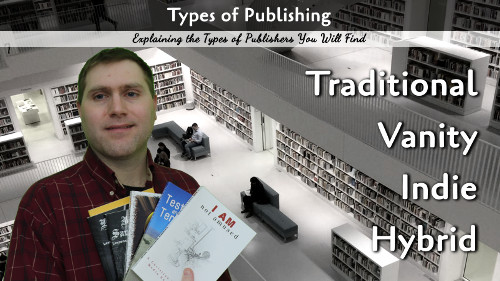If you have ever jumped on a search engine to see how to get your book published, you may have encountered a variety of different publishing companies. What do they all mean? This article will briefly define each type of publishing and give a brief list of pros and cons.
The publishing industry brings with it a variety of options for everyone. None of these methods are completely right or wrong in all cases, but some will have advantages based on your personal needs. Hopefully we will be able to teach you enough to help guide your decision about what type of company to use. The only one I generally avoid is vanity press, but there are some reasons to use it.
Publishing Companies
Traditional
The traditional publishing company are the old style publishers where your manuscript is submitted and you wait for an answer. If your book is selected, you often receive an advance against your royalties. Your manuscript is usually submitted via an agent, so if you aspire to publishing traditionally, start hunting for an agent.
Pros
- Royalty advance
- No business experience needed
- They handle creative process
Cons
- Highly competitive
- Long time to print
- Low royalties
- Share royalties with agent
Vanity / Self
The Vanity, or Self publishing companies (different from self-publishing yourself), allow you to bring your book to print for a fee. They offer services that can publish your book in less than six months, with higher royalties. The downside is they require an upfront fee and your personal cost to buy author copies is generally very high.
Pros
- Books nearly always accepted
- Fast to publish
- No business experience needed
Cons
- Expensive on every front
- Not as "respectable"
- No help in marketing (unless you pay more)
Indie Press
The Indie Press companies are like traditional press, except they are usually smaller, do not offer advances to royalties, and get your books to the market faster. Each one is a little different, so some extra research may be needed to determine what you get from the company. They may or may not require going through an agent.
Pros
- No business experience needed
- More control over creative design
- Faster to bring to market
Cons
- Lower royalties
- Smaller reach
- Narrow genera
Hybrid Press
Hybrid press is a newer distinction in the publishing industry. The term does not have a rigid definition, so if you are working with a hybrid company, be sure to know exactly what you are getting into. We cannot provide a specific pros and cons list since each one is different. The best overall definition is Hybrid Press is an à la carte model where you can buy specific services needed. It is very much like doing your own self-publishing, but allowing the company to take some royalty in exchange for managing the business end of things.
I hope these definitions has helped you to understand more about publishing services. If you are in need of help, feel free to contact us to talk about what your publishing needs are.


